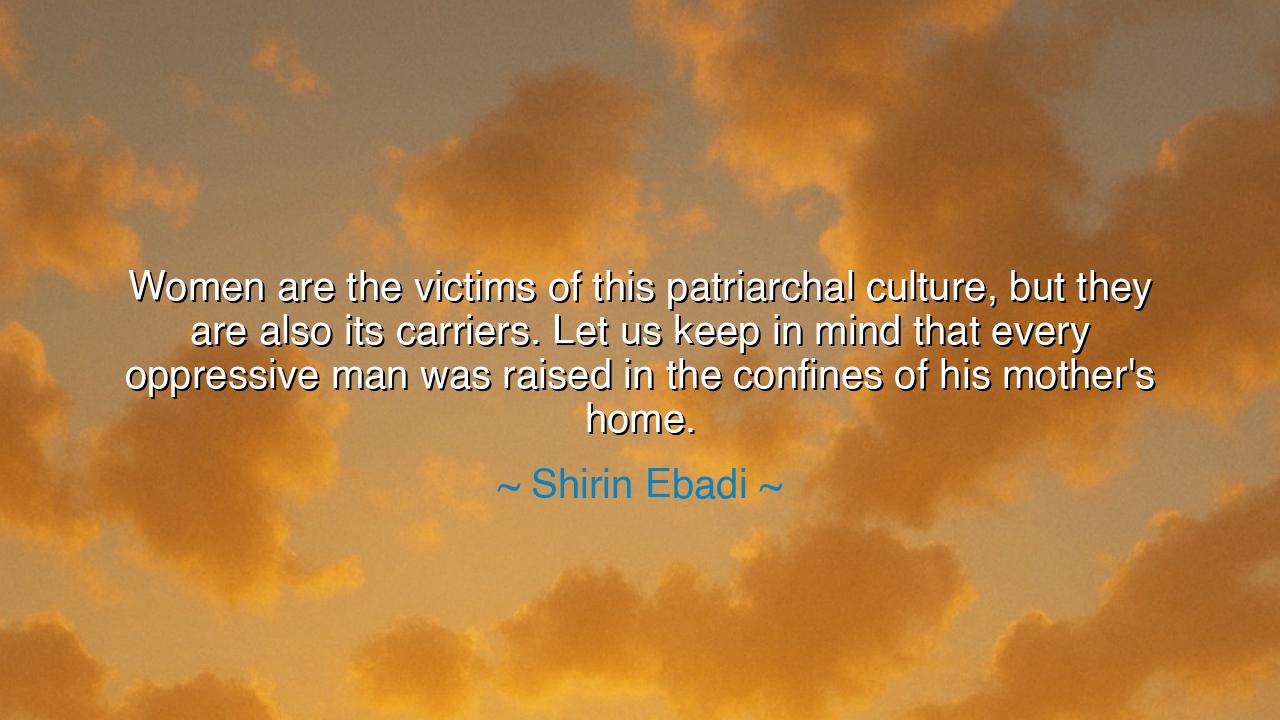
Women are the victims of this patriarchal culture, but they are
Women are the victims of this patriarchal culture, but they are also its carriers. Let us keep in mind that every oppressive man was raised in the confines of his mother's home.






In the piercing and prophetic words of Shirin Ebadi, Nobel Peace Prize laureate and fearless advocate for human rights, we encounter a truth that is both painful and profound: “Women are the victims of this patriarchal culture, but they are also its carriers. Let us keep in mind that every oppressive man was raised in the confines of his mother’s home.” These words strike not at individuals, but at the roots of civilization itself. They remind us that oppression does not spring from men alone, but from a system so ancient, so deeply woven into daily life, that it passes through generations like an inherited shadow. Ebadi speaks with the wisdom of one who has looked not only at injustice but into the heart of its origins.
The patriarchal culture she names is not merely a political order; it is a centuries-old belief that defines power, gender, and worth. It has crowned men as rulers and reduced women to silence, convincing both that this order is natural. In this culture, women suffer under laws and customs that deny them agency—but, as Ebadi reveals, they also unwittingly perpetuate it, passing down the same beliefs that once bound them. When she says that “every oppressive man was raised in his mother’s home,” she is not blaming the mother; she is naming the cycle. The boy learns early what strength means, what weakness means, what womanhood is permitted to be—lessons often taught not by cruelty, but by example, tradition, and fear.
This truth was known, too, to the ancients. The philosopher Plato wrote that “the beginning is the most important part of the work,” for it is in childhood that the foundation of the soul is formed. A child raised in the shadow of oppression learns its rhythm as naturally as breathing. And so Ebadi’s wisdom points us to the cradle as both the source of love and the birthplace of power. The mother, herself bound by expectation, may teach her son dominance without knowing, and her daughter submission without wanting. The system thus sustains itself, not through the strength of its chains, but through the quiet acceptance of its victims.
Consider the story of Rosa Luxemburg, revolutionary thinker and activist of the early twentieth century. She fought fiercely for justice and equality, yet often spoke of how even the most progressive societies still trapped women in the ancient habits of obedience. Luxemburg understood, like Ebadi, that the revolution for freedom must begin not only in the laws of nations, but in the hearts of families—in how children are taught to see one another. Without transformation within the home, no nation can truly become free. For how can a society heal its injustices when they are born anew in every household?
Ebadi’s message is not a condemnation—it is a call to awakening. When she says that women are the carriers of patriarchy, she does not accuse them; she challenges them to become liberators instead of vessels. She reminds us that to raise children is to shape the future, and that every mother, teacher, and guardian holds the power to change history. If each woman, each man, taught their child equality instead of hierarchy, respect instead of dominance, empathy instead of control, then the ancient order would crumble without a war. The walls of patriarchy, built over millennia, could fall through the simple yet sacred act of conscious upbringing.
Yet this transformation demands courage, for culture resists change. Many mothers teach submission not because they believe in it, but because the world punishes defiance. To raise a free child in an unfree world is an act of heroism. It requires breaking the invisible scripts of behavior that have been whispered for generations. Ebadi herself, an Iranian judge stripped of her position for being a woman, understood this struggle intimately. She fought not only the rulers of her land, but the internalized beliefs that told women to remain silent. Her victory lay not in rebellion alone, but in education, for she knew that minds enlightened by truth cannot easily be enslaved.
The lesson, then, is one of responsibility and hope. The fight against oppression is not only fought in courts or on the streets—it begins in the home, in the language we use, in the values we teach, in the stories we tell our children. To the mothers, the fathers, the teachers of the next generation: you are the architects of the world to come. Every word of kindness sown instead of cruelty, every act of respect shown between man and woman, becomes a seed of liberation. Do not underestimate the quiet revolution that begins at your own table.
So, dear listener, remember the wisdom of Shirin Ebadi: that to dismantle injustice, we must first look within the walls we call home. The oppressor and the oppressed are born from the same soil; it is how we tend it that decides the future. Let every mother, every parent, choose to raise not rulers or servants, but equals—souls unafraid to honor both strength and tenderness. For only when the heart of the household changes will the heart of the world be transformed. And then, at last, the long shadow of patriarchy will fade into the dawn of true human freedom.






AAdministratorAdministrator
Welcome, honored guests. Please leave a comment, we will respond soon